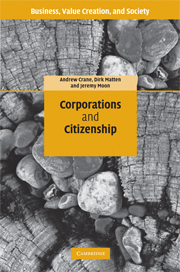Book contents
- Frontmatter
- Contents
- List of figures
- List of tables
- Foreword
- Preface
- Acknowledgements
- 1 Introducing corporations and citizenship
- Part A Corporations and citizenship relationships
- 2 Corporations as citizens
- 3 Corporations as governments
- 4 Stakeholders as citizens
- Part B Corporations and citizenship reconfigurations
- 8 Conclusion
- References
- Index
4 - Stakeholders as citizens
Published online by Cambridge University Press: 22 September 2009
- Frontmatter
- Contents
- List of figures
- List of tables
- Foreword
- Preface
- Acknowledgements
- 1 Introducing corporations and citizenship
- Part A Corporations and citizenship relationships
- 2 Corporations as citizens
- 3 Corporations as governments
- 4 Stakeholders as citizens
- Part B Corporations and citizenship reconfigurations
- 8 Conclusion
- References
- Index
Summary
The provenance of the ‘corporate democracy’ oxymoron has long been understood. The idea results from the inappropriate conflation of political ideals with market institutions. Its persistence can only be attributed to the intelligentsia's far greater comfort and familiarity with political models and events than with knowledge and appreciation of how markets function.
Henry G. Manne, The ‘Corporate Democracy’ Oxymoron, The Wall Street Journal, 2 January 2007Introduction
In the previous chapter, we saw how our conception of corporations as acting like governments prompted us to consider an expanded and reconfigured constituency for corporate decision-making. Rather than thinking simply in terms of traditional stakeholder groups and relationships, a view of corporations as governments suggested a focus on citizens more broadly. This idea, that relevant corporate constituencies are not only stakeholders but can also be conceptualized as citizens, is not entirely new, nor is it relevant only for a view that assumes that corporations have adopted governmental responsibilities. Indeed, there has been a whole collection of work that has examined stakeholder groups as though they were citizens, but in the main this literature has not been concerned with the political role of the corporation as such, but rather with using the political metaphor of citizenship in some way to examine the specific rights and responsibilities that employees, consumers and other stakeholders might have in their relations with the firm.
- Type
- Chapter
- Information
- Corporations and Citizenship , pp. 88 - 122Publisher: Cambridge University PressPrint publication year: 2008

